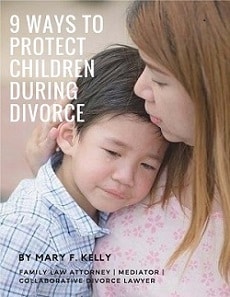When parents separate, one of the first tasks is to decide on a custody and coparenting plan, with a weekly or monthly visitation schedule for when the children will spend time with each parent. It has become more common for parents to want an equal, or reasonably equal, division of time with their children. I have many clients whose children switch between their parents’ homes during the week, each week.
Children have feelings about their visitation schedule, of course. How much of a say should they have in when they go where? What makes this so difficult to answer is that it does not take place in a vacuum—they are adjusting to the loss of an intact family, they may have to leave what has been their home, they often have feelings about which parent is responsible for the divorce, and they may prefer Mom or Dad’s parenting style over the other’s. In rare cases, children allege that one parent has been abusive, or even sexually abusive.
Does the court consider what the child wants?
The court takes various factors into consideration when weighing a child’s wishes regarding custody and visitation schedule. One factor is the age of the child: In a recent case decided by the New York State appellate court, a father was allowed to relocate to Las Vegas with his children, ages 14 and 16, against the wishes of the mother, who lives in New York. The court cited the wishes of the children as one of the reasons for its decision. The older the child is (until age 18), the more likely the court will consider where the child wants to live. However, if the parents share custody and live within a reasonable travel distance, judges usually encourage some time with each parent, unless there is a compelling reason against it.
Is there bias caused by the parents?
When the court considers a child’s wishes regarding custody and visitation, it also considers whether the child has been influenced or pressured into his or her opinion by the favored parent. In custody cases, one parent often believes the children’s views have been influenced by the other parent’s bias, but it is hard to prove. Sometimes one parent denigrates the other, perhaps telling the children inappropriate details about finances or adultery so they take the side of the parent who reveals the information. Courts are wary of these alienating behaviors, although major medical and mental health associations have dismissed “Parental Alienation Syndrome” as lacking supporting empirical or clinical evidence.
There are also reasons aside from parental alienation that a child may want to spend more time with one parent than the other. It may be because one was the primary caregiver before the divorce, the child has feelings about a new significant other, one parent initiated the divorce, or one parent had been physically or emotionally absent from the child’s life. Recent research suggests that it is extremely hard to determine if a parent’s influence has turned a child against the other parent.
Forensic evaluation
When parents seek court intervention to resolve custody and coparenting, the judge may appoint an Attorney for the Child (or Children), who advocates for the the children’s wishes regarding custody. The judge may also appoint a forensic (psychologist or psychiatrist) to interview every family member—parents and children—in order to do a custody evaluation. The forensic will ask questions to find out the circumstances underlying a child’s preferences. Parental alienation has become a significant factor when a court makes a custody decision, and judges often accept the findings of a court-ordered forensic report. If a forensic determines that the child’s preferences are the result of parental alienation, the court usually will not honor the child’s wishes in a custody order.
What should a parent do when a child complains about custody, the visitation schedule or other decisions being made about his or her life?
- Ideally, when you and your spouse decided to separate or divorce, you sat and talked to your children together about what was going to happen (“Dad or Mom will be moving into another home…”). If you haven’t, be sure to say that both of you love him/her and there is nothing the child did to cause the separation or divorce. Also be sure to say that both Mom and Dad want to be part of the child’s life going forward.
- If possible, tell the child that you and the other parent will talk together about his or her complaint or opinion (and follow up by talking about it with the other parent, and getting back to the child).
- If the child expresses anger or alienation toward one or both of you, try to get to the bottom of it. Is it a matter of parenting style (for example, one is a disciplinarian and one is a spoiler)? It may be appropriate to remind your child that both parents love him/her and want to look out for his/her best interests.
- Remember that there are many factors at work in how much time your child wants to spend with each of you. Most children have feelings of anger toward one–or both–parents after a divorce. It is a loss that will take them time to adjust to. Young children, preteens and teenagers have different reactions based on their level of emotional development.
- If the child openly advocates to live with one parent, while it may be tempting to support the child’s position to keep him or her happy, it is important for parents to set the basic framework for custody scheduling. Do not allow a child to decide whether his/her residence is with Mom or Dad; the popularity test is not a sound basis for parent-child relationships. The parent who is “on the outs” should examine the child’s complaint and consider changing his or her behavior so the child feels loved by both parents. Adjusting the visitation schedule may also help the child feel appreciated and understood. Family therapy can be a good way to work through the problem or complaint expressed by the child.
Copyright 2019 by Mary F. Kelly, Esq.





Parents have the hardest job in the world.